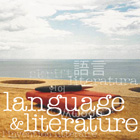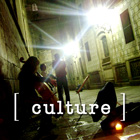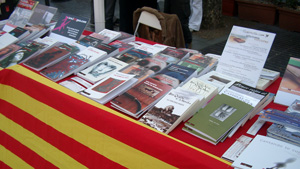
|
THRONGS OF BOOK SHOPPERS AND BOOKMARK COLLECTORS FLOOD THE CITY CENTER IN SEARCH OF THE UNEXPECTED 24 April 2006 The Dia de Sant Jordi —as Cataláns would have it— marks both the feast day of the patron saint of Barcelona, and the increasingly international Day of the Book, which falls on the 23rd of April, in honor of the two great pioneers of modern literature, Cervantes and Shakespeare, who died on that date in the year 1616. Barcelona's unique approach to this literary celebration has been exported in varying degrees to other cities and other countries —Japan is one case—, largely because of the sentimental tradition of exchanging gifts of books and red roses, a romantic sign of cooperation among lovers or affection and cooperation among families. Catalunya's vibrant publishing culture, long the heart of the Spanish book export trade —Barcelona being both a printing capital and a major port city—, to be honored at Frankfurt's 2007 book fair for its unique resilience and tenacity, has come to see "Sant Jordi" as a focal point for high volume book sales.
Indeed, the major publishers and bookstore chains expect to do a major percentage of their annual selling on that one day, and to a lesser extent in the days leading up to it. So the event is in some ways a unique flourishing of interest in the intellectual realm of local culture. Television and radio attend, interview authors; prominent writers travel from other countires and other continents to make an appearance and pitch their new wares. Some even draw crowds of rowdy, enthusiastic and star-struck followers. It's a day for aficionados, but also for people getting their first taste of the soup that is the modern publishing world, when viewed in this panoramic light. Part of what is so interesting about the day is the vast array of themes, languages, titles, genres and styles available. A table selling Spanish-language classics may include new authors, books accompanied by music and a few titles in Catalán. A Catalán-focused stand may carry rare antique translations of "Don Quixot" into Catalán, and may dabble in radical-secularist republican literature or spiritual histories, all for the sake of the language and its various political constituencies. And between the two, you might see a stand selling Persian-origin writings with a mostly spiritual theme, but which also include modern books on economics and some western philosophers, all set out in the languages —in fact threefold— de la zona, i.e. Catalán, Castilian (Spanish), and English. And amid all of this, travelers from all over the world, many who happen upon the date and location of the bustling book fair by accident, search for the one or two books in their language. Conversations spring up in sketchy Italian about one of the images on a book cover and its relation to politics or to pop culture back home, and Americans ask curiously how long this has been going on for... which nobody seems to know exactly. It's this kind of event that sets Barcelona apart as a city that is pressing its stamp into the cosmopolitan culture of the times. An urge to know and to be known by other societies, to exhibit what is one's own and to explore what emerges from other sources, to mix and mingle ideas, people, topics, book-buying, romance and tourism. Some locals will say the crowds become such a deluge that they will not go out, if they live right in the center, but the city's rich cultural life feeds off events like this, and its international population is broadened and brought together by the near giddy spirit of literary engagement. Sant Jordi demonstrates that at the dawn of the 21st century, Barcelona seeks to retain the real-world, tete-a-tete intellectualism that brought so much richness, humanism and innovation at the dawn of the 20th, still a uniquely conscientious will to improve on the trends of the times. [s]
RELATED STORIES: El día 23 de abril se celebra en Barcelona como el 'Dia de Sant Jordi', en reconocimiento de su santo tradicional, San Jorge. Es también la fecha en que, según la historia, murieron Shakespeare y Cervantes en el año 1616. Por lo tanto, se ha convertido en el 'Día del Libro', festival que llega a ser el día en que se venden más libros. [Texto completo] POLITICS OF LANGUAGE IN DIVERSE SPAIN Spain's opposition PP has accused the regional government of Catalunya of "investigating, inspecting and sanctioning" businesses that put signs exclusively in Castilian (the language commonly known as "Spanish", though it originates in the central Spanish region of Castile, and other regions use other languages), according to La Vanguardia newspaper. [Full Story] MULTILINGUAL SOCIETIES SHOW NEW DYNAMISM Both North America and Europe are becoming increasingly mixed societies, drawing from large pools of legal and illegal immigrants, many of whom are migrating to countries whose predominant language they themselves do not speak. The US, for example, is the world's fifth largest Spanish-speaking country, with some 35 to 40 million native speakers. In New York City, more than half of all residents speak a language other than English in their homes. [Full Story] |
||||||||||||
|
|||||||||||||





